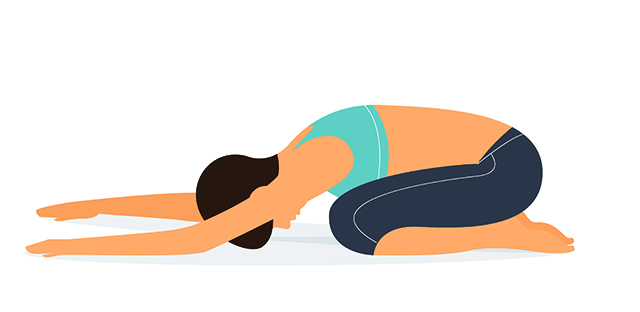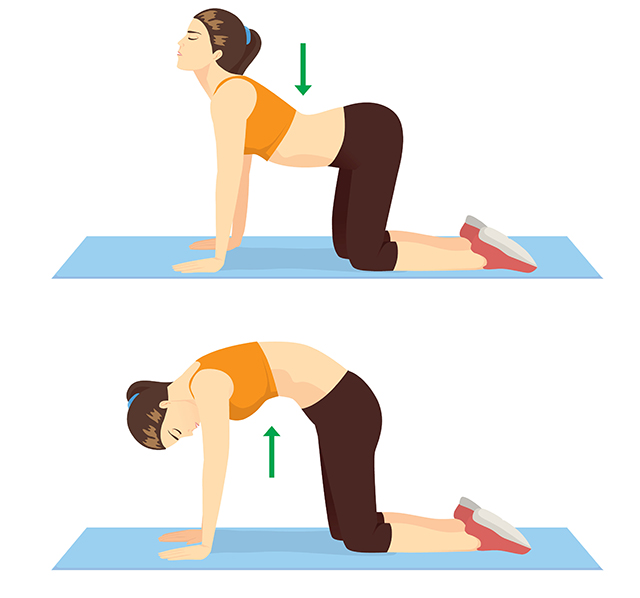Dr Philippa Kaye On Back Pain

Back pain can be miserable to live with but there are ways to manage the discomfort and find relief, says Dr Philippa Kaye…
There are a few health issues which come up frequently in general practice. In the winter months we will see lots of children with coughs and colds, and in the spring we start to see people with hay fever.
However, one of the most prevalent complaints seen in general practice all year round is one which my patient, Carla, presented with a few months ago: back pain.
Carla is not someone who comes to the doctor regularly. She is generally fit and well and said she occasionally got back ache, but in the week before she came in to see me she bent down to pick up a shopping bag and felt her back “go”. The pain came on suddenly and she felt extremely stiff. Back pain can come and go or be constant, and can be achy or sharp.
It can also radiate into your hips or down your leg.
There can also be other symptoms such as pins and needles or numbness in your feet or legs.
When to seek help for back pain
If you have any weakness in the legs, difficulties passing urine or stool (incontinence or retention), or feel numb in the saddle region when you wipe yourself, please seek urgent medical advice.
What support is available?
Carla had tried some over-the-counter paracetamol but needed stronger painkillers which I was able to prescribe for her. I also told her to keep moving, as the adage of resting a bad back is not great advice; it simply leads to muscle weakness which increases your risk of injury!
She was given some exercises and told to contact us again to be referred for physiotherapy if she didn’t get better in a few weeks.
But, like most people, she improved on her own with time.
Most of us have experienced back pain at some point and it can impact on your quality of life and make it difficult to carry out your normal daily activities. Painkillers, ice or heat packs can be useful to help you manage your pain. Also, consider wearing flat, supportive shoes as opposed to a high heel.
Exercises for back pain
Some simple exercises to try for back pain include starting on all fours and pushing your bottom back to stretch your spine.
A cat stretch, where you start on all fours and slowly suck in your belly button as you arch your back upwards before returning to the all fours starting position can help.
Other exercises include lying on your back and bending your knees to put your feet flat on the floor. Then slowly roll your knees from side to side keeping your shoulders on the floor.
You can also try the knee to chest stretch where you lie flat on the floor without bending your knees and slowly lift one leg, hug the knee towards your chest as far as it is comfortable for a few slow breaths before returning and repeating on the other side.
Your GP may be able to print out a leaflet with some helpful back exercises. If your pain does not improve your GP may refer you to a physiotherapist for exercise advice, massage and other techniques. If this doesn’t help, or if you develop other symptoms, you may be referred for an MRI scan and/or to see a specialist.
There are lots of treatment options available ranging from injections of steroids to surgery.
If you develop chronic pain, the chronic pain team may be able to help, not solely with medication options but also with seeing a psychologist for techniques to help you manage and live with the pain. However, just like Carla, for most people, back pain improves in a short space of time.
Ways to protect your back
Even if you aren’t someone who has back pain, there are things that we can do to protect our backs.
Maintaining a healthy weight and regular physical activity is important. Also, try to focus on your posture. It can be hard to correct after years of slouching but it can help. Think about how you work: do you hunch over a computer, or answer the phone with it cradled between your neck and shoulder?
Think before you lift: don’t bend at the waist to pick something up. Instead, bend your knees into a squatting position, keeping your spine straight, to pick it up.
Advice given in this article and on the My Weekly website and magazines is not meant to replace personalised medical advice from your doctor. If you have any health concerns please see your doctor.
Article written on November 23, 2023; article reviewed and updated on November 28, 2024.
Each week we’ll ask Dr Philippa Kaye to talk about a prominent health issue, so look out for more articles in our health and wellbeing section in coming weeks. Read her advice on Skin Cancer, Allergies, Parkinson’s Disease, Shingles, Ovarian Cancer, Endometriosis, Long Covid and Ticks and Lyme Disease.








